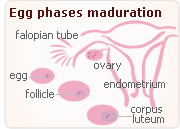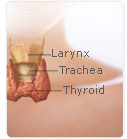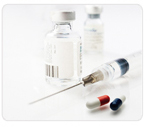
Progesterone is one of two main hormones, the other being estrogen, made by the ovaries of menstruating women. In addition to being produced by the ovary during fertilization, it is secreted by the adrenal gland in smaller amounts. Progesterone plays a fundamental role in conception and pregnancy. It is also the precursor of estrogen and helps in the production of testosterone and the adrenal cortical hormones. If a hormonal imbalance occurs some of the symptoms of low progesterone can appear. The following paragraphs outline the symptoms, causes and solutions in dealing with low progesterone.
What Are the Symptoms of Progesterone?
Quick Fact:
Low progesterone symptoms can manifest themselves in complications with the menstrual cycle, fertility and reproductive issues. General symptoms include irregularity during the menstrual cycle, cramps and higher incidence of blood clots during periods. When progesterone levels are extremely low, infertility can stop because ovulation is not occurring.
Menopause can cause a reduction in progesterone which may be responsible for typical menopause symptoms such as mood swings, hot flashes, and a lowered libido. Sufferers of low progesterone may also experience fatigue, dry skin, and depression. Another possible set of symptoms associated with low progesterone are those affecting memory. People may experience memory loss or lack of mental acuity when levels of this hormone are well below normal.
Quick facts:
Sometimes low progesterone symptoms can be more dangerous. For example, chronic depression or anxiety, and could lead to a higher risk to suicidal behavior. Low progesterone levels can also make certain forms of cancer more likely, particularly uterine cancer.
10 Tasks of Progesterone

- Stimulate the production of estrogen and testosterone
- Act as a natural diuretic
- Transform fat into energy
- Function as a natural anti-depressant
- Regulate the thyroid
- Restore sex drive
- Normalize blood sugar levels
- Protect against breast and endometrial cancer
- Protect against osteoporosis
- Normalize blood clotting
What Causes Low Progesterone Levels?
The majority of women begin to produce dramatically less progesterone in their 40s. This progesterone deficiency causes several symptoms of menopause, and creates several health issues for women.
Quick Fact:
Given that, menopausal symptoms, osteoporosis and heart disease may not be due to an estrogen deficiency, but due to a relative estrogen excess as a result of progesterone deficiency. During the perimenopause, more menstrual cycles become anovulatory (meaning when the ovaries fail to produce an egg). These are characterized by low progesterone production relative to estrogen. These cycles can be accompanied by normal symptoms of menopause and low progesterone such as, breast tenderness, depression, bloating, weight gain, headaches, and foggy thinking.
Treatments for Low Progesterone

For women suffering from low progesterone there are a range of treatments - from capsules, injections, and therapy - that can help ease the symptoms. Menopausal hormone therapy either makes use of estrogen therapy on its own or combined with other progesterone treatments. Whilst progeston-only treatment is uncommon for the symptoms of low progesterone, it is possible for it to be used by individuals on the basis of a doctor's recommendation. Fortunately (though some may disagree), whatever treatment you use for dealing with low estrogen needs to be accompanied by a healthy, balanced lifestyle. This is to allow the body a chance of managing the decrease in hormones on its own.